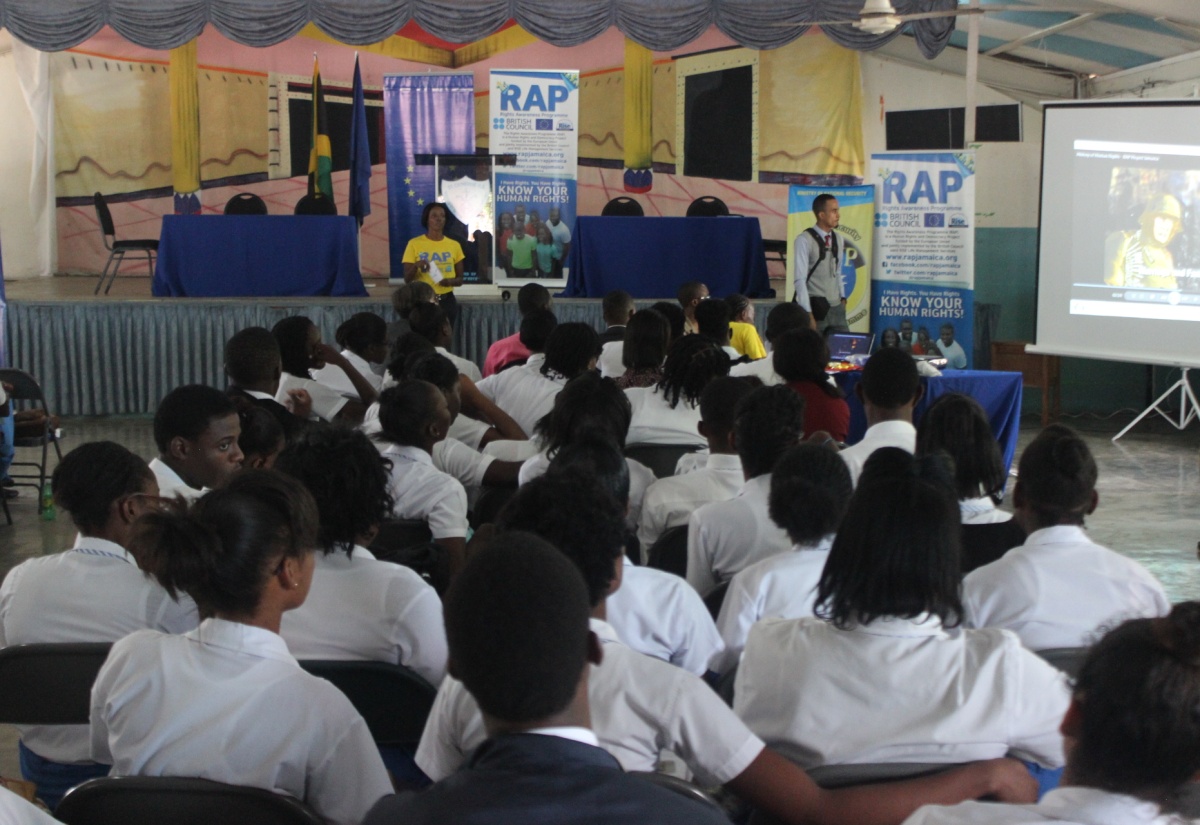More Young People Aware Of Human Rights Issues
By: , December 1, 2015The Key Point:
The Facts
- The RAP is a European Union (EU) funded initiative, which seeks to raise youth awareness of the Universal Declaration of Human Rights (UDHR) as well as equip them with the skills and knowledge necessary to become good global citizens.
- RAP was implemented by RISE Life Management Services Limited and the British Council, with the support of the Citizen Security and Justice Programme (CSJP).
The Full Story
More than 1,300 young people have received training to improve their awareness of human rights issues and democracy, through the Rights Awareness Programme (RAP).
The RAP is a European Union (EU) funded initiative, which seeks to raise youth awareness of the Universal Declaration of Human Rights (UDHR) as well as equip them with the skills and knowledge necessary to become good global citizens.
Communications Officer for RAP, Jessica Jones, told JIS News that the programme is necessary because many persons, including young people, are unaware of their rights and the associated responsibilities.
“On a daily basis, people use the term ‘human rights’ very loosely, but not many of them know that there are 30 such rights on which all other laws are formed. In our daily life, each of us has those 30 rights with the responsibility to live up to them and respect them in others. That is our main message to young people,” she explained.
Ms. Jones highlighted that the programme is particularly inclusive, as deaf and blind students have also been trained.
Through RAP, four youth forums were coordinated and executed, which provided an opportunity for young people to comment on human rights issues locally and internationally as well as engage with youth leaders and advocates.
In addition to the more than 1,300 students exposed to basic human rights, 100 were trained in human rights advocacy.
The project also targets civil society organisations by providing capacity building opportunities.
Earlier this year, 20 grants were presented to Community-based Organisations (CBOs) to implement human rights awareness projects.
The anticipated results of the programme include increased awareness and understanding by citizens of their rights and responsibilities; strengthened institutional and operational capacity of civil society organisations; and increased accessibility to direct funding for advocacy and awareness-raising by youth.
At the end of the two-year programme in December, a document recommending the inclusion of human rights education in schools will be presented to the Ministry of Education.
“Pieces of it (human rights education) are included in the curriculum … but the whole concept of rights and responsibilities is excluded and that is what we are promoting,” she said.
Meanwhile, sixth form student at St. Catherine High School, Chadwick White, told JIS News at the final RAP forum, held on the school grounds, that the forum has inspired him to get on board and further the work that RAP has started in his school and other social settings.
“I am interested to further this work because prior to this session my knowledge base was not exhaustive and the little I knew could be attributed to my Internal Assessment done for school, so I can imagine how many other persons do not know about these fundamental rights,” he said.
RAP was implemented by RISE Life Management Services Limited and the British Council, with the support of the Citizen Security and Justice Programme (CSJP).
The UDHA has been incorporated into Constitutions of countries worldwide, making it constitutional law.
In 2011, the Jamaican Constitution was amended to incorporate the UDHR and modern changes in human rights law. These changes, which are the rights of all Jamaicans, are known as the Charter of Fundamental Rights and Freedom (Constitutional Amendment).


